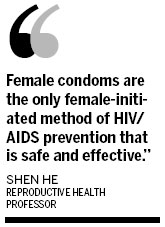Female condoms, a new choice
Updated: 2013-05-30 08:07
By Yang Wanli in Kuala Lumpur (China Daily)
|
||||||||

Women able to use safer and more convenient form of contraception
NGOs are calling for the use of female condoms in China, especially among unmarried women, to prevent unwanted pregnancy and disease.
"Female condoms give women control and choice over their own sexual health. They can protect themselves when their partners do not want to use a male condom," said Zhang Yun, the program officer from PATH, at the Women Deliver conference in Malaysia on Wednesday.
PATH is one of the NGOs that promote female condoms in China. Female condoms provide enhanced sensation for men compared with male condoms. They may also provide more protection for skin-to-skin transmitted diseases such as herpes and the human papilloma virus.
Since 1993, about 300 million women's condoms have been distributed in 120 countries, and public-sector programs are under way in more than 90 countries, according to the World Health Organization.
The availability of female condoms, particularly in developing countries, has increased from 14 million in 2005 to 50 million in 2010. However, based on data in the Reproductive Health Interchange, a reproductive health procurement and information service managed by the United Nations Population Fund, they only account for approximately 0.2 percent of global condom sales.
In the past six months, the Chinese Center for Disease Control and Prevention has purchased more than 10,000 female condoms, providing them to sex workers in the country. The China Contraceptive Supplies Center at the National Health and Family Planning Commission bought another 40,000, which are mainly handed out to married women.
"Female condoms are the only female-initiated method of HIV/AIDS prevention that is safe and effective," said Shen He, a reproductive health professor with the commission.
In many countries female condoms are not new, however they cannot be easily found in pharmacies or supermarkets in China.
Zhang said some people are worried about possible inconvenience or discomfort, or just can't accept that women can also use condoms. "That's why we turned to young women first because they might accept new things more easily," she said.
China's health department has promoted female condoms since the early 2000s. A research paper on the use of the condoms among sex workers released by the National Research Institute for Family Planning in 2002 indicated that their use could be greatly improved through active intervention.
The rate of sex workers who reported liking female condoms increased from 60 percent pre-intervention to 93.5 percent post-intervention. And the rate of sex workers who considered that their clients could accept female condoms increased from 27 percent to 92 percent.
After the intervention, 94 percent said their sexual satisfaction had increased with their familiarity with the condoms, and 97 percent said they would use them in the future.
Different from the first generation of female condoms, the new ones that will be sold in China are easier to insert and they do not slip or move during use.
With a 0.03 mm polyurethane film, they bring more comfort to users. The condom should be inserted hours before intercourse and does not require immediate withdrawal afterward.
Chisomo Ngulube from Malawi stood in front of the booth for the new condom in the Kuala Lumpur Convention Center for more than 10 minutes, asking questions about the new product.
"Many women in Africa use female condoms as a temporary way of contraception. It is not new to us, but it is my first time to see such a thin and convenient one, which impressed me a lot," she said.
yangwanli@chinadaily.com.cn
(China Daily USA 05/30/2013 page6)

 Michelle lays roses at site along Berlin Wall
Michelle lays roses at site along Berlin Wall
 Historic space lecture in Tiangong-1 commences
Historic space lecture in Tiangong-1 commences
 'Sopranos' Star James Gandolfini dead at 51
'Sopranos' Star James Gandolfini dead at 51
 UN: Number of refugees hits 18-year high
UN: Number of refugees hits 18-year high
 Slide: Jet exercises from aircraft carrier
Slide: Jet exercises from aircraft carrier
 Talks establish fishery hotline
Talks establish fishery hotline
 Foreign buyers eye Chinese drones
Foreign buyers eye Chinese drones
 UN chief hails China's peacekeepers
UN chief hails China's peacekeepers
Most Viewed
Editor's Picks

|

|

|

|

|

|
Today's Top News
Shenzhou X astronaut gives lecture today
US told to reassess duties on Chinese paper
Chinese seek greater share of satellite market
Russia rejects Obama's nuke cut proposal
US immigration bill sees Senate breakthrough
Brazilian cities revoke fare hikes
Moody's warns on China's local govt debt
Air quality in major cities drops in May
US Weekly

|

|







